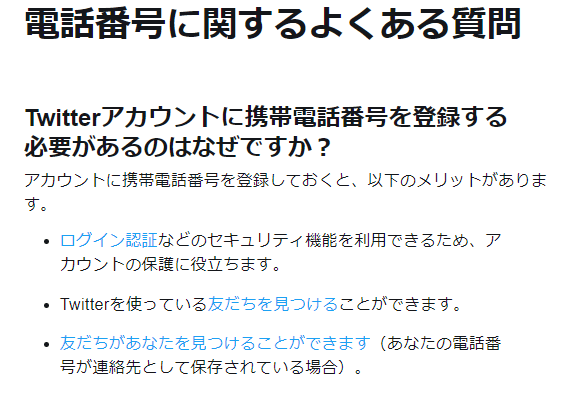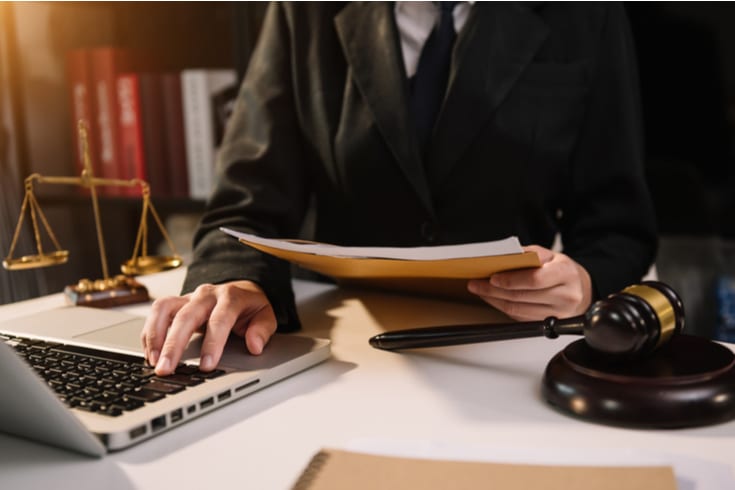What is the Disclosure Request for Phone Numbers of Defamation via Anonymous Twitter Made Possible by the Amendment of the 'Japanese Ministry of Internal Affairs and Communications Ordinance'?

When slanderous acts occur on anonymous social media platforms like Twitter, the following steps were typically taken to identify the poster:
- First, request the disclosure of the IP address related to the post from the service provider, such as Twitter.
- Identify the provider from the disclosed IP address and request them to prohibit the deletion of logs.
- Request the provider to disclose the name and address of the poster.
This procedure was essentially the only method available.
https://monolith.law/reputation/indentify-poster-twitter-attorney-fee[ja]
However, due to the amendment of the Ministry of Internal Affairs and Communications Ordinance in 2020 (Gregorian calendar year), it became possible to request the disclosure of phone numbers as “another method” for part of the above process, with Twitter as the counterparty.
To conclude, even after the amendment of the Ministry of Internal Affairs and Communications Ordinance, there are still cases where it is necessary to request the disclosure of IP addresses.
On the other hand, there are also cases where requesting the disclosure of phone numbers is effective. I will explain the mechanism of requesting the disclosure of phone numbers and the method of requesting the disclosure of IP addresses, focusing on points such as cost and duration.
Amendment to the Ministry of Internal Affairs and Communications Ordinance and Requests for Disclosure of Anonymous Twitter Phone Numbers
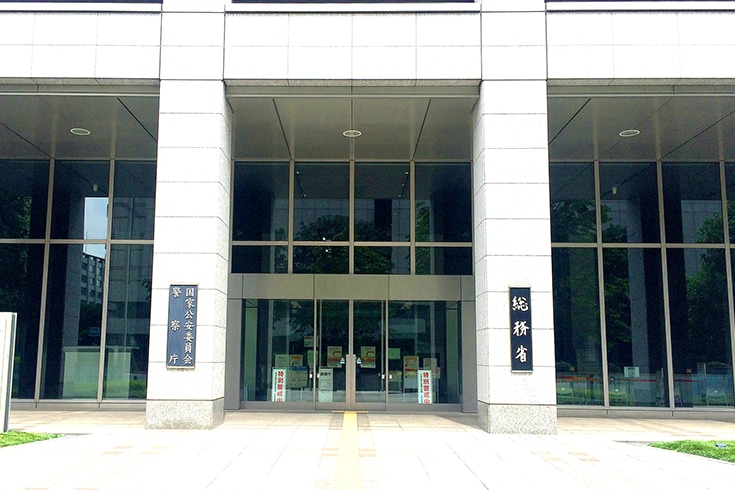
The Ministry of Internal Affairs and Communications announced the following in the “Ordinance to Amend Part of the Ordinance Defining the Sender Information of Article 4, Paragraph 1 of the Law on Limitation of Liability for Damages of Specific Telecommunications Service Providers and Disclosure of Sender Information” dated August 31, Reiwa 2 (2020).
The sender’s phone number will be added to the sender information related to the infringement of rights that are subject to disclosure requests based on Article 4, Paragraph 1 of the Provider Liability Limitation Law (Amendment Ordinance No. 3).
Overview of the Ordinance to Amend Part of the Ordinance Defining the Sender Information of Article 4, Paragraph 1 of the Law on Limitation of Liability for Damages of Specific Telecommunications Service Providers and Disclosure of Sender Information [ja]
In simple terms, this means:
- The so-called Provider Liability Limitation Law (Provider Liability Law) stipulates that if you suffer damage such as defamation, you can request the “provider” to disclose “sender information” defined by the Ministry of Internal Affairs and Communications Ordinance about the user who made the post.
- Previously, the “sender information” defined by the Ministry of Internal Affairs and Communications Ordinance only included things like IP addresses, but with this amendment, phone numbers have been added.
The concept of “provider” in the Provider Liability Law includes not only ISPs (such as KDDI for landlines or docomo for mobile phone lines), but also web service operators (like Twitter).
https://monolith.law/reputation/provider-liability-limitation-law[ja]
https://monolith.law/reputation/disclosure-of-the-senders-information[ja]
As a result, for example, if you suffer from slanderous damage by an anonymous account on Twitter, you can now request Twitter to disclose not only the IP address related to the post, but also the phone number.
Phone Number Disclosure Requests are not ‘All-Purpose’
At first glance, one might think that the process of identifying a poster, which previously required three steps, has now been simplified to a two-step process. This could be interpreted as making it significantly easier to identify posters than before.

However, there are three major issues that suggest otherwise. These will be explained below.
Issue 1: Phone numbers may not be registered
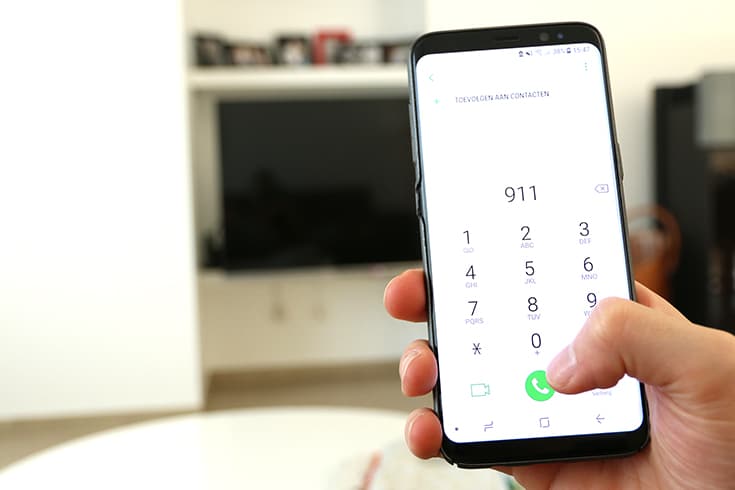
However, there is a significant issue here. The point is that the Twitter account of the perpetrator of defamation may not necessarily have a registered phone number.
Phone number registration is not “mandatory” for using Twitter. According to Twitter’s FAQ, registering a phone number allows you to use security features such as login authentication, which helps protect your account, and you can find and be found by friends. However, phone number registration is not mandatory, and there are accounts without registration.
Regarding this point, the current Twitter allows you to check whether a phone number is registered for a certain account from the password reset screen. Specifically, if you enter the username from “Forgot your password?” for the account that is defaming, the phone number and email address registered for that account will be displayed as shown below.
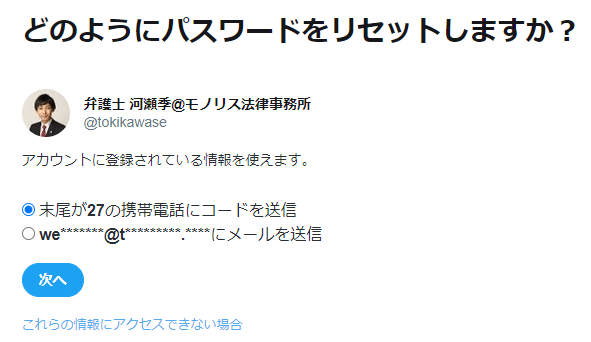
If the option “Send a code to the mobile phone ending in ●●” is not displayed as shown above, it means that the account does not have a registered phone number. However, as you can see, this feature allows third parties to confirm the “last two digits of a user’s mobile phone number,” which may feel a bit “creepy” to users who are properly using Twitter. It is uncertain how long this feature will continue.
At least in general terms, “what information a user has registered for a service (Twitter)” is not visible from the outside, and in the case of the current Twitter, as shown above, you can confirm the presence or absence of phone number registration by a kind of “trick” method.
Issue 2: Identifying Address and Name from Phone Number is Not Certain

Even if you were able to obtain a phone number disclosure from Twitter, there is the question of what to do next. Of course, once the phone number is known, you could call that number and hope that the person on the other end willingly provides their address and name. However, if they refuse to provide this information or do not answer the phone at all, the problem arises of how to identify their address and name in order to make a claim for damages based on defamation or similar grounds.
In this regard, the first thing that comes to mind is that if the phone number is known, the mobile carrier (such as docomo) can identify it. Therefore, you could request the carrier to disclose the “address and name of the subscriber using the said phone number”. This disclosure request is effective through a 23rd Article Inquiry (Japanese Bar Association Inquiry).
https://monolith.law/reputation/references-of-the-barassociations[ja]
However, from the perspective of the mobile carrier receiving this 23rd Article Inquiry (Japanese Bar Association Inquiry), the current situation is that they “have a duty to disclose the address and name in response to the request” but “there is no penalty for not disclosing”. Therefore, whether or not they respond to the inquiry in reality depends on the operation of the mobile carrier. It is not something that can be enforced with the power of a court judgment, and there is an uncertain aspect as to when the operation of the mobile carrier may change.
Furthermore, this article will omit the details, but when the so-called MVNOs, or the providers of “cheap SIMs” that use the bandwidth of mega carriers like docomo, are involved, the identification of the address and name from the phone number becomes even more complicated.
In any case, it cannot be said with certainty that the “identification of address and name from the phone number” is always possible.
Issue 3: The Required Duration and Time Limit for Provisional Dispositions and Lawsuits
This is a somewhat complex issue, but first, let’s look at the previously used method of identifying posters, namely,
- First, request the disclosure of the IP address related to the post from the service provider, such as Twitter.
- Identify the provider from the disclosed IP address and request the provider to prohibit the deletion of logs.
- Request the provider to disclose the name and address of the poster.
These were realized through the following procedures:
- Provisional disposition (required duration: medium)
- Out-of-court negotiation (required duration: short)
- Lawsuit (required duration: long)
Although we will omit the details in this article, in summary,
Originally, procedure 1 should also be conducted through a lawsuit. However, providers do not store logs indefinitely, and there is a strict time limit for their storage period. Therefore, if procedure 1 is conducted through a lawsuit, which requires a long duration, there is a high risk that the time limit will pass before procedures 1 and 2 are completed. Moreover, the IP address itself has a weak connection with the individual, so even if it is disclosed without careful judgment, the problem is minor. Therefore, it is permitted to use a provisional disposition, which is faster and requires a shorter duration, for procedure 1.
That’s the gist of it.
https://monolith.law/reputation/prescription-of-defamation[ja]
However, unlike the above request for IP address disclosure, the request for phone number disclosure is,
- There is no risk of time limit because the log of “who is the contractor of a certain phone number” does not disappear over time, even if the required duration of the procedure is long.
- Compared to IP addresses, phone numbers have a stronger connection with individuals, and if they are disclosed without careful judgment, the problem is significant.
Therefore, the current operation of the Tokyo District Court is that it is appropriate to use a lawsuit procedure, which requires a long duration, rather than a provisional disposition procedure, which requires a medium duration.
Should We Request Disclosure of IP Addresses or Phone Numbers?

With the amendment of the Japanese Ministry of Internal Affairs and Communications Ordinance, indeed, in cases of defamation, it is now possible to request Twitter to disclose either IP addresses or phone numbers. However,
- Request for IP address disclosure → Possible even with provisional disposition (The term “even” here means “also possible in court”)
- Request for phone number disclosure → Not possible without a court trial
There is such a difference. Therefore, when identifying the poster, you have the following options:
- Request IP address disclosure in a provisional disposition and identify the poster in the same way as before
- Request phone number disclosure in court and identify the poster using Article 23 inquiry (Japanese Bar Association inquiry) etc.
- In court, request for disclosure of both IP address & phone number, identify the poster based on the IP address in the same way as before, and use Article 23 inquiry (Japanese Bar Association inquiry) etc. based on the phone number
- Carry out 1 and 2 simultaneously (Conduct provisional disposition and trial against Twitter at the same time)
And for each of these,
- It is possible to identify the poster as before, but since it involves three procedures, it inevitably increases costs and time
- There are issues such as whether a phone number is registered, and there are problems as mentioned above in identifying the name and address from the phone number
- The court procedure has a “long necessary period”, and there is a time limit issue as mentioned above for identification from the IP address
- “Carrying out simultaneously” means conducting both of the two procedures, which inevitably increases costs
There are such disadvantages.
Summary
As such, with the recent amendment to the Japanese Ministry of Internal Affairs and Communications Ordinance, determining the identity of a Twitter poster has become a more specialized task that requires a high level of judgement, particularly in deciding whether to request the disclosure of an IP address or a phone number from Twitter.
In a nutshell, the traditional method of requesting the disclosure of an IP address is a relatively reliable method with a high likelihood of successful identification. However, it requires time and there is a risk of failure to identify due to time constraints, especially for older posts.
On the other hand, the method of requesting the disclosure of a phone number has some uncertainties, but it may be possible to identify the poster even for older posts, and it may also be possible to reduce the total time and cost.
However, whether to use either method, or to pursue both simultaneously, must be comprehensively judged based on various related circumstances. This judgement inevitably becomes specialized, which is the reality of the situation.
It would be advisable to consult with a law firm that has expertise and a track record in identifying Twitter posters.
Category: Internet

